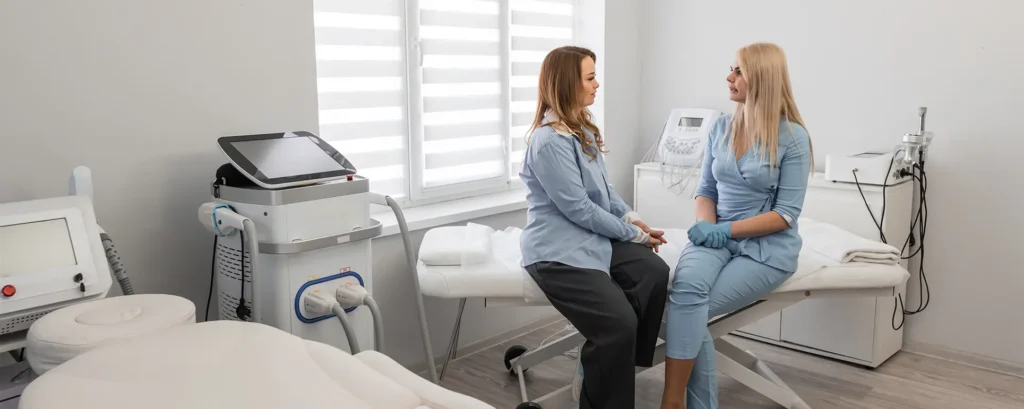When Your Skin Hurts, So Does Your Confidence
It’s easy for others to dismiss skin issues as ‘just cosmetic’ as something surface-level that shouldn’t be taken too seriously. But for those living with visible skin conditions, the impact goes far deeper than what meets the eye. Skin is our body’s largest organ and one of the first things others notice about us. So, when it becomes inflamed, irritated, or broken out, it can feel like you’re constantly on display and not in a good way.
Whether it’s the relentless itch and discomfort of eczema, the deep, painful lumps of cystic acne, or the emotional strain caused by psoriasis flare-ups, these conditions can leave lasting scars not just on your skin, but on your self-esteem. You may find yourself avoiding social situations, skipping events, or spending too much time trying to cover up the symptoms with clothing or makeup. For some, the fear of being judged or stared at becomes a daily burden.
And it’s not just about how others see you it’s also about how you see yourself. Studies have shown a strong connection between skin health and mental health. People with chronic skin conditions often experience higher levels of anxiety, depression, and low self-worth. This connection, sometimes referred to as the “skin–mind connection,” is very real and deserves attention.
That’s why understanding this link is so important. When you acknowledge how your skin affects your emotional well-being, you’re better equipped to seek the right kind of support whether that’s medical treatment, therapy, lifestyle changes, or simply having compassionate conversations with those around you.
Relief isn’t just about clearing up a rash or reducing a breakout it’s also about finding peace of mind, regaining your confidence, and feeling like yourself again.
The Skin-Mind Connection: What the Science Says
Your skin isn’t just the body’s largest organ it’s also one of the most emotionally expressive. Think about how you blush when you’re embarrassed or get goosebumps when you’re scared. That’s because your skin is deeply connected to your nervous system, which links it directly to your mental and emotional state. In fact, what’s happening in your mind can often show up on your skin.
Scientific research has long supported the idea that emotional stress, anxiety, and depression can trigger, worsen, or prolong a range of skin conditions. These include acne, eczema, rosacea, psoriasis, hives, and even hair loss. When you’re under stress, your body releases hormones like cortisol and adrenaline. These hormones can ramp up inflammation, disrupt your skin barrier, and even cause an overproduction of oil leading to breakouts or flare-ups.
But here’s where it gets even more complex: the relationship is two-way. It’s not just that stress affects your skin. The presence of a chronic skin condition especially one that is visible or painful can increase your feelings of emotional distress. You might experience shame, embarrassment, low self-esteem, or even social withdrawal. Over time, this emotional burden can contribute to more serious mental health conditions, including anxiety disorders and depression.
This two-way relationship is known in clinical circles as the “psychodermatological” connection. It highlights how skin and mind don’t just coexist they interact in a loop that can be incredibly hard to break. For example, someone dealing with psoriasis might become anxious about an upcoming social event, which then leads to a flare-up. That flare-up could make them cancel plans, feel isolated, and become even more anxious. And so, the cycle continues.
Understanding this science-backed connection is crucial. It explains why simply applying a cream or taking medication may not be enough. Addressing both the physical and emotional dimensions of skin health through stress management, therapy, and holistic care can make a significant difference in breaking the cycle and healing both inside and out.
The Emotional Toll of Visible Skin Conditions

It’s not just about how your skin feels it’s about how you feel being seen. Skin plays a central role in how we present ourselves to the world, and when that skin is affected by a chronic or visible condition, the emotional impact can be profound and far-reaching.
For many people, the experience goes well beyond physical discomfort. It’s the fear of judgment when someone notices a flare-up. It’s the anxious scanning of your face in the mirror every morning, wondering if today will be a “good skin day.” It’s the sinking feeling when someone stares too long or offers unsolicited advice. And it’s the exhaustion of carrying those invisible emotional weights day after day.
People who live with conditions like acne, eczema, psoriasis, vitiligo, or rosacea often report:
- Low self-esteem: You may feel unattractive or less confident in personal and professional settings.
- Body image issues: Skin conditions can distort how you see yourself, leading to feelings of inadequacy or self-consciousness about your appearance.
- Social anxiety: The fear of being looked at or judged can make everyday interactions like meeting new people or attending events stressful or even unbearable.
- Avoidance behaviours: You might cancel plans, avoid dating, skip the gym or beach, or hide under layers of clothing and makeup just to feel “safe.”
- Feelings of isolation and shame: Skin conditions can make you feel like no one understands what you’re going through, especially if others dismiss it as “just a skin issue.”
Even mild breakouts or short-term rashes can have a surprising emotional impact, particularly if they appear right before a big presentation, a job interview, or a social gathering. The unpredictability of flare-ups adds another layer of emotional strain, as it creates a sense of helplessness or lack of control over your own appearance.
Skin Conditions That Commonly Affect Mental Health
While anyone can struggle emotionally due to skin changes, some conditions are especially known to take a toll on mental health both because of how they look and how they feel. These skin issues aren’t just surface-level problems; they affect people’s confidence, social lives, sleep, and overall sense of wellbeing. The emotional fallout can be just as serious and sometimes more debilitating than the physical symptoms.
Here are some of the most common skin conditions that are closely linked to psychological distress:
- Acne:
Often dismissed as a teenage phase, acne can cause serious emotional pain at any age. For teens and young adults in particular, breakouts can lead to social withdrawal, embarrassment, and even clinical depression. Studies show that the psychological burden of acne can be as heavy as that of chronic health conditions like asthma or diabetes. Adults with acne may feel especially frustrated, as it’s often perceived as a “teen problem,” making them feel out of place or abnormal. - Eczema (Atopic Dermatitis):
This condition is known for its maddening itchiness, which leads to the relentless itch-scratch cycle. The constant discomfort can disrupt sleep, reduce concentration, and make it hard to relax or stay calm. Eczema sufferers often feel anxious about when the next flare-up will strike, and in children, it can affect learning, behaviour, and emotional development. The appearance of red, irritated patches can also contribute to feelings of embarrassment or self-consciousness. - Psoriasis:
As a chronic autoimmune condition, psoriasis is unpredictable, painful, and often very visible appearing on the scalp, face, hands, knees, and elbows. Its scaly patches can draw unwanted attention and questions, which many people find humiliating. The stigma surrounding psoriasis can lead to deep emotional distress, including feelings of hopelessness, isolation, and low self-worth. Some individuals even develop clinical depression because of the ongoing stress and social challenges associated with the condition. - Rosacea:
Often misunderstood as blushing or simply having “sensitive skin,” rosacea is a chronic condition that causes redness, visible blood vessels, and acne-like bumps, primarily on the face. Because it affects the most visible part of the body, sufferers frequently become self-conscious or anxious in social and professional settings. This fear of judgment can lead to avoidance behaviour and a decline in social confidence, particularly in jobs that require face-to-face communication. - Vitiligo:
Vitiligo causes patches of skin to lose their pigment, leading to stark contrasts in skin tone that are often highly visible. In many cultures where even skin tone is heavily associated with beauty or status, this condition can lead to deep emotional trauma, especially in children and young adults. People with vitiligo may face bullying, discrimination, or misunderstanding from others, all of which can contribute to anxiety, depression, and social avoidance.
Social Media and the Pressure to Look Perfect
In today’s always-online world, we’re constantly exposed to carefully curated images especially when it comes to beauty and skincare. Scroll through any platform, and you’ll see a never-ending stream of smooth, glowing, “flawless” skin. But here’s the truth: flawless skin is everywhere except on real people. And for those living with acne, rosacea, pigmentation, or chronic skin flare-ups, this digital perfection can be a painful reminder of what they feel they lack.
The pressure to look a certain way online has created an unrealistic beauty standard one shaped by filters, lighting tricks, angles, editing apps, and often expensive cosmetic procedures. What many people don’t realise is that even influencers and celebrities who promote “natural” skin often rely on skin-smoothing filters or undergo treatments that are inaccessible or unaffordable to the average person.
For someone already feeling vulnerable due to a visible skin condition, this constant comparison can significantly deepen insecurities and emotional distress. It can lead to:
- Body dysmorphia: A mental health condition where you become excessively preoccupied with perceived flaws in your appearance flaws that may be minor or even invisible to others. Skin texture, pores, or breakouts can become overwhelming focal points.
- Skin-picking behaviours: Also known as dermatillomania, this compulsive picking or squeezing of skin can be triggered by stress, anxiety, or obsessive comparison, often resulting in more damage and even scarring.
- Heightened anxiety before social events: The fear of being seen or photographed when your skin doesn’t look “perfect” can make you dread birthdays, weddings, or even a simple hangout with friends.
- Pressure to overspend on products or procedures: Many people fall into the trap of buying excessive skincare products, supplements, or trying quick-fix cosmetic treatments in hopes of achieving an airbrushed appearance that isn’t even real.
The Role of a Dermatologist in Emotional Wellness

When we think of dermatologists, we often picture someone prescribing creams or performing procedures to treat skin conditions. But a good dermatologist offers much more than medical solutions they become a key partner in your journey toward both physical and emotional healing.
Skin issues are not just surface problems; they often go together with anxiety, embarrassment, or even deep emotional pain. That’s why the most compassionate and effective dermatologists take a holistic approach. They treat you as a whole person, not just a patch of skin. They listen carefully to your concerns, understand your frustration, and recognise the mental toll that comes with chronic or visible skin conditions.
A skilled and empathetic dermatologist can help you in the following ways:
- Accurately diagnose your condition: Many skin conditions can look alike but require very different treatments. An accurate diagnosis is the first step to both physical relief and peace of mind. Knowing what you’re dealing with can reduce uncertainty and anxiety.
- Create personalised treatment plans: Rather than a one-size-fits-all approach, a thoughtful dermatologist will tailor treatments to your unique skin type, lifestyle, and goals. This increases your chances of success and gives you a greater sense of control over your condition.
- Refer you to mental health support if needed: Dermatologists trained in psychodermatology (or simply aware of its importance) may suggest talking to a therapist or counsellor, especially if your skin condition is affecting your mood, self-esteem, or daily life.
- Educate you on coping strategies and self-care: Beyond prescriptions, they can provide practical advice for managing stress, avoiding triggers, building a skincare routine you can actually stick to, and understanding your emotional reactions.
- Track emotional as well as physical progress: A truly holistic dermatologist doesn’t just ask, “How’s the rash today?” They ask, “How are you doing?” They care about how your condition is impacting your sleep, your confidence, your mood, and your quality of life.
When to Seek Help for the Mental Side of Skin Issues
There’s a common misconception that you should only seek help when things become unbearable. But when it comes to mental health especially as it relates to your skin the earlier you reach out, the better. You don’t have to “wait until it’s really bad.” Emotional distress is valid at any stage of your journey, whether you’re dealing with mild acne or a long-standing chronic condition.
If your skin is starting to affect how you feel about yourself, how you interact with others, or how you go about your day-to-day life, it’s time to take that seriously. Your emotions are not overreactions they’re signals asking for care and attention.
Here are some signs that it might be time to seek support from a mental health professional, in addition to dermatological care:
- You avoid mirrors or social situations: If you’re constantly checking or avoiding your reflection, or you cancel plans because you feel embarrassed about your skin, it’s more than a cosmetic issue it’s affecting your quality of life.
- You feel hopeless about your appearance: Feeling like you’ll “never look normal again” or like you’re stuck in a cycle of treatments that don’t work can take a real emotional toll. Hopelessness and low self-worth are red flags that shouldn’t be ignored.
- You’ve had panic attacks or depressive episodes linked to your skin: If your emotional response to breakouts, flare-ups, or visible changes in your skin includes intense anxiety, sadness, or even thoughts of self-harm, please know this is serious and treatable.
- You’re picking, scratching, or hiding your skin obsessively: Repetitive behaviours like skin-picking or covering up with heavy makeup or clothing can indicate underlying anxiety or body-focused repetitive behaviours (BFRBs), which may need professional intervention.
- You feel alone and misunderstood in your experience: If people around you don’t seem to get how deeply your skin condition is affecting you, it can be incredibly isolating. Therapy or support groups can help you feel seen, validated, and understood.
Treatment Isn’t Just Creams: Holistic Solutions That Work
When we think of treating skin conditions, most people picture topical creams, ointments, or maybe the occasional prescription pill. But for many individuals, real relief only comes when treatment goes beyond the surface. That’s because skin and mental health are tightly connected and lasting improvement often requires a whole-person approach.
Combining medical care with emotional support and lifestyle adjustments can not only improve your skin but also enhance your overall wellbeing and confidence. Here are several holistic strategies that work well alongside traditional dermatological treatments:
- Cognitive Behavioural Therapy (CBT):
CBT is one of the most effective tools for addressing the emotional impact of skin issues. It helps you identify and change negative thought patterns, such as “I’m not attractive because of my skin,” or “People are judging me.” CBT can also help break harmful habits like skin-picking or mirror-checking, and it provides practical coping strategies for stress and anxiety. - Stress Reduction Techniques:
Since stress is a known trigger for many skin conditions including acne, eczema, and psoriasis managing it is key. Mindfulness practices like meditation, breathing exercises, yoga, and journaling can calm the nervous system and reduce inflammation. Even just a few minutes a day can make a noticeable difference in both skin and mood. - Lifestyle Changes:
Small shifts in your daily habits can lead to big improvements. Prioritising quality sleep allows your skin to heal and regenerate. Staying well-hydrated keeps your skin barrier healthy. Eating a balanced anti-inflammatory diet (rich in omega-3s, antioxidants, and fresh produce) can reduce flare-ups. Reducing screen time can help, too especially if you’re caught in a cycle of comparing yourself to filtered images online. - Support Groups:
Whether in-person or virtual, support groups provide a safe space to share your experiences, ask questions, and receive encouragement from people who truly understand what you’re going through. Knowing you’re not alone can be incredibly validating and healing. - Prescription Medications:
In some cases, combining skin treatments with medications for anxiety or depression may be appropriate. This doesn’t mean your struggle is “all in your head” it means you’re treating the mind-body connection in a balanced way. Always consult with both your dermatologist and a mental health professional when exploring this option.
Final Thoughts: You Are Not Alone in This
It’s okay to feel frustrated. It’s okay to feel sad. And it’s more than okay to ask for help. Skin conditions can feel isolating, but millions of people are walking the same path, and many have found healing through the right support.
You don’t have to choose between treating your skin and caring for your mind. You deserve both.
You can get in touch with us to book a consultation with one of our expert dermatologists who understands not just your skin concerns, but the emotional weight they carry. We’re here to support your wellbeing inside and out.
References:
- Linder, M. D. & Campolmi, P., 2018. Psychodermatology: A Practical Manual for Clinicians. [online] Clinical Dermatology Journal. Available at: https://www.ncbi.nlm.nih.gov/pmc/articles/PMC5841213/
- Basra, M. K. A. & Finlay, A. Y., 2007. The family impact of skin diseases: The greater patient concept. British Journal of Dermatology, 156(5), pp.929–937. Available at: https://onlinelibrary.wiley.com/doi/full/10.1111/j.1365-2133.2007.07881.x
- Gupta, M. A. & Gupta, A. K., 2003. Psychiatric and psychological co-morbidity in patients with dermatologic disorders. American Journal of Clinical Dermatology, 4(12), pp.833–842. Available at: https://link.springer.com/article/10.2165/00128071-200304120-00004
- Picardi, A., et al., 2005. Stress, social support, emotional regulation, and exacerbation of psoriasis. Psychosomatic Medicine, 67(4), pp.620–626. Available at: https://journals.lww.com/psychosomaticmedicine/Fulltext/2005/07000/Stress,_Social_Support,_Emotional_Regulation,_and.15.aspx
- Narang, T. & Kumaran, M. S., 2013. Psychosocial aspects of vitiligo. Indian Journal of Dermatology, 58(6), pp.430–434. Available at: https://www.ncbi.nlm.nih.gov/pmc/articles/PMC3875261/
